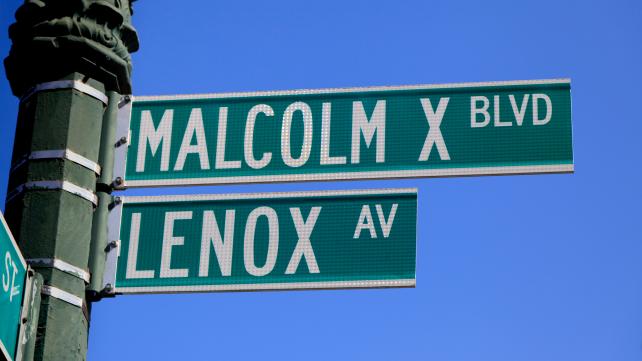Malcolm X: “Betty Is a Good Muslim Woman and Wife”

“ The world is but a (quick passing) enjoyment; and the best enjoyment of the world is (to have) a pious wife.” [Riyad as-Salihin]
There is an old American proverb that behind every great man is a great woman. Although people are aware of the life and accomplishments of civil reformers, many are not as well acquainted with the life history and influence of the women who stood by these reformers.
Malcolm X’s wife, Dr Betty Shabazz, was a reserved, quiet woman. On February 21, 1965, while just a few months pregnant with twins, her life changed. There in the Audubon Ballroom on 165 th Street in Washington Heights, with her four young daughters at her side, she sat listening to her husband of seven years addressing a crowd of 400 people.
She was expecting trouble. There had been death threats. Just a week earlier, the family's house in Elmhurst, Queens, had been firebombed in the night. She knew a violent act was imminent.
And it was there that the brutal murder of her husband happened before her very eyes. As the shots rang out, she quickly swept her four daughters to the floor covering them with her body not only to protect them from bullets, but also to protect them from viewing this horrendous crime with their own eyes. Her husband succumbed to his wounds and at only 30 years of age, Betty Shabazz found herself a widow.
Betty’s life had already been full of challenges. At the age of 11, Betty was removed from an abusive home and adopted by a prominent businessman and his wife from Detroit. Her foster parents tried to protect Betty from the ills of racism, but the society at the time would not let that become a full reality. After completing high school in Detroit, Betty headed down south to attend the Historically Black College Tuskegee University. But the Jim Crow laws that existed at the time were overwhelming and too oppressive for a woman of her sensitive nature. So much so that Betty changed her major from education to nursing and transferred to Brooklyn State College School of Nursing in New York.
Her foster parents disapproved of the move, but the move to New York was pivotable because she then met her future husband Malcolm X. On January 15, 1958, on the same day she received her nursing license, Malcolm and Betty were married in Lansing, Michigan.
In an interview, Dr Shabazz shared that when she and Malcom first married, he was a bit of a controlling husband. But then one day, she let him know her expectations of him as a Muslim husband. After dinner he said, “Boy, Betty, something you said hit me like a ton of bricks. Here I’ve been going along having our little workshops with me doing all the talking and you doing all the listening, but our marriage should be a mutual exchange.”
It was this type of husband-and-wife relationship that caused Betty to be almost broken at the loss of her husband in February 1965. Two Muslim friends approached her about making Hajj. Betty had contemplated it ever since her husband had testified to its beauty.
So, in late March 1965, just a month after her husband had been assassinated, Dr Shabazz left for Mecca to make the annual pilgrimage. She marveled at the diversity of the Muslim Ummah and understood how this could have so profoundly impacted her husband. Her sadness and despair lifted away and her emotional balance was restored. A fellow Hajjah (pilgrim) noted her joy and called her Bahiyah which means beautiful and radiant. This became her Muslim name.
Before she left Al-Haram, Prince Faisel, then-ruler of Saudi Arabia, gave her a special audience. He told her that she and her children should consider Saudi Arabia as their country and invited her to settle permanently in Saudi Arabia as official guests. This offer gave her something to think about as she returned to the United States and later delivered twin girls.
Although she was busy as a mother of six young children, Dr Shabazz realized that it was her duty to keep the legacy of her husband alive. In interviews she began to share sprinkles of insight into the man. In one interview she revealed, “Well he was, he was extremely disciplined, I mean it was just, ah, it was just unbelievable, you know, he, ah, said five prayers a day without fail, he used to write to me from various parts of the world.”
Dr Shabazz went on to educate herself and later work at Medgar Evers College in New York while serving as a human rights activist in her own stead. She shared that Malcolm had told her before his death “Don’t be bitter… when they kill me, and they surely will. You have to use all of your energy to do what it is you have to do.” She firmly repeated his message in a 1992 interview with the Atlanta Journal and Constitution:
''Malcolm's agenda was human rights and self-determination.”
Dr Shabazz worked hard to make sure that leftists, radicals, Malcomites or conservatives did not co-opt his image, words or work and make them their own. She slowly began making irregular appearances and speaking on health, the education of disadvantaged children, and the beliefs and causes for which he lived and died. It was through her efforts that schools, community centers, plays, operas, films, and even a Malcolm X stamp was issued.
Dr Shabazz kept the flame burning of her husband’s legacy. This was surely accomplished solely through her faith and resiliency. El Hajj Malik Shabazz knew that he had a good wife who would be an inspiration not only to him, but to others when he said:
“ Betty’s a good Muslim woman and wife. I don’t imagine many other women might put up with the way I am.”

